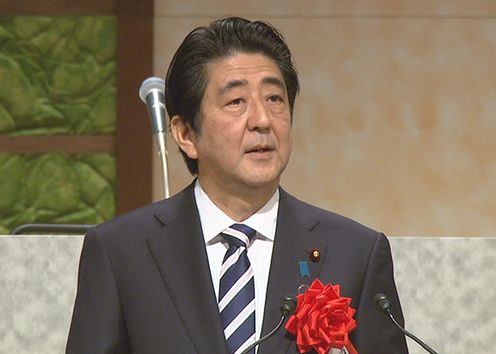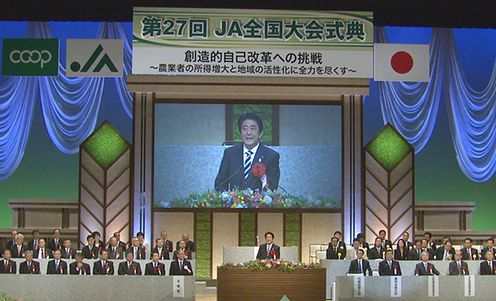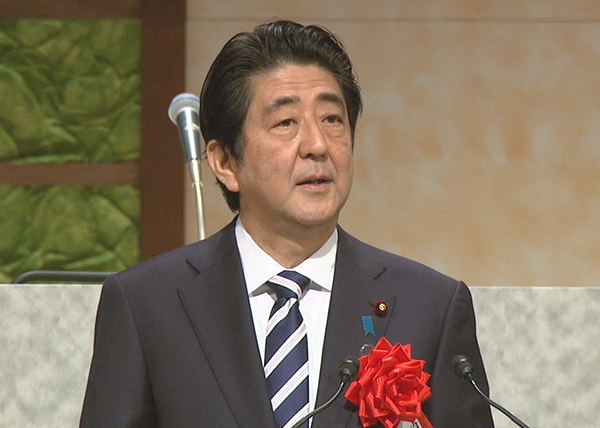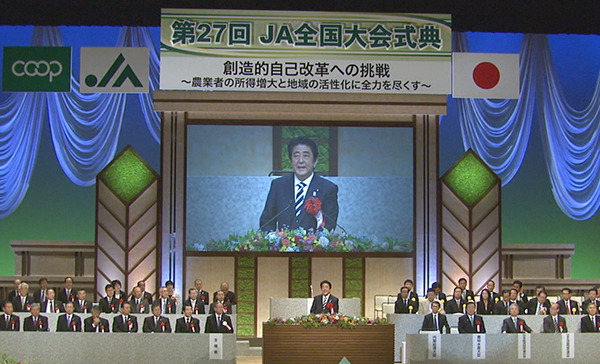Home > News > The Prime Minister in Action > October 2015 > National Meeting of Japan Agricultural Co-operatives
The Prime Minister in Action
National Meeting of Japan Agricultural Co-operatives
October 15, 2015

Photograph of the Prime Minister delivering an address (1)

Photograph of the Prime Minister delivering an address (2)
[Provisional Translation]
Prime Minister Shinzo Abe attended the 27th National Meeting of Japan Agricultural Co-operatives held in Tokyo.
The Prime Minister said in his address,
“It gives me great pleasure to be present at the opening of this National Meeting of Japan Agricultural Co-operatives, an event that occurs only once every three years, with the participation of so many people from across the country. I also want to thank you all for inviting me here today. I would like to again express my respect for the tremendous contribution that everyone in the Japan Agricultural Co-operatives (JA) is making to ensure food safety and security for our nation and to promote agriculture.
The first time I ever attended a National Meeting of Japan Agricultural Co-operatives was three years ago, when I had just been elected as the President of the Liberal Democratic Party of Japan (LDP) . At that time, I stated that the agricultural industry is influenced by factors such as climate and the environment, that developed countries around the world were thinking strategically to protect their agricultural industries, and that every government was working to raise their food self-sufficiency rate. In light of that, related to TPP negotiations, I promised in front of all of you that Japan could not agree to the TPP if we were requested to treat no tariff as sacred or off-limits, and that we would protect Japan’s national interests as well as our agricultural economy and the regions.
As you already know, the TPP was agreed upon in principle on October 5. Through the course of negotiations, I repeatedly stated that we would be ‘pressing forward assertively in areas where we should, while also protecting what must be protected .’ Above all, we could not accept any requests to treat no tariff as sacred or off-limits when discussing agricultural products. This was the major precondition of our participation in negotiations. We worked to thoroughly secure exceptions to the lifting of tariffs for important items such as rice and wheat, sugar cane and sugar beets, beef and pork, and dairy products. We also acquired the establishment of a new safeguard mechanism with which to restrict imports as an emergency measure in the event that imports of those agricultural products were ever to suddenly increase rapidly. By taking an active lead in negotiations, Japan has worked through tough negotiations to achieve the best possible results for our national interests. I was able to uphold my promise to you all. This I believe.
With that said, will it be possible for our agricultural industry to continue to thrive once we enter the TPP? I know that many people feel tremendous concern about this.
The area where I was born has since amalgamated with Nagato City, but it was once known as Yuya Town. It is a small town located on the Japan Sea with terraced rice fields. When the moon is out and shines on each of the rice fields, or when one can see the lanterns being used for fishing at night in the distance, it is the kind of beautiful landscape that can take one’s breath away. It is a wonderful hometown. I remember when I was younger, riding around the town in a truck to advertise my campaign during an intense election, I was approached by an old man. He shook my hand with the rough hands of someone who works in the agricultural industry, and encouraged me by saying, “Abe-san. I will support you. Please look after our hometown.” I still hold those words dear.
Agriculture is the very foundation of our nation. It is the responsibility of politics to protect our beautiful rural landscapes. I am sympathetic to the concerns of the people of the agricultural industry who are asking me to look after their hometowns. We must turn the agricultural industry into a field in which young people aspire to work and can pioneer new horizons with their own passions.
Japan has many world-class agricultural products – delicious rice, sweet and juicy fruit, marbled beef. These products are not just well regarded within Japan, but by consumers overseas as well. I have heard that among even regional agricultural cooperatives are those who have constructed long-standing year-round shipping systems that are exporting Japanese yams to places like the United States , as well as those who are exporting rice to places like Australia, the United States, and Singapore through tie-ups with domestic wholesalers. In addition, we are also seeing the start of measures by agricultural cooperatives for the export of a variety of other products, such as oranges, kumquats, daikon radishes, sweet potatoes, and beef.
In many countries under the TPP, the tariffs on agricultural products will be lifted. This is an opportunity for our variety of Japanese food products to expand further into global markets. I will lead the way and have Minister Moriyama work hard on this issue so that moving forward, the entire Government will take responsibility for this matter, compile all possible measures, and enact them. We will continue to protect the beautiful rural landscapes, hometowns with their own traditions, and the rural village culture of mutual assistance that make up Japan’s proud ‘national character.’ There has been absolutely no change to that resolve.
Since ancient times, as a ‘land blessed with rice,’ we have had a tradition of waking up early in the morning, working hard to cultivate the fields, sharing water, and praying for a good harvest for all. When someone is unfortunately sick, the people of their village help them by bringing them rice. Grounded in this spirit of mutual help, since the enactment of the Agricultural Co-operatives Act in 1947, agricultural cooperatives have been organizing cooperation activities with their members and playing a major role in such matters as the sale of agricultural products and purchase of production materials.
However, compared to the time that the Agricultural Co-operatives Act was enacted, there has been great change to our social and economic situation – for instance, the average age of workers in the agricultural industry is now over 66 years old. That is why in this past ordinary Diet session, we undertook a fundamental reform of the Agricultural Co-operatives Act in order to reconsider the entire agricultural cooperatives system for the first time in 60 years.
We will return to the starting point of agricultural cooperatives as ‘cooperative associations of agricultural producers,’ and create an environment in which ambitious players in this industry can become even more active. Free economic activities by regional agricultural cooperatives will make it possible to exert every effort toward improving the incomes of agricultural producers. JA and the Central Union of Agricultural Co-operatives (JA-ZENCHU) will appropriately support regional agricultural cooperatives without limiting their free economic activity. This is the basic thinking behind the reform of agricultural cooperatives.
How we realize and carry out that way of thinking depends on the agricultural workers of each cooperative and the management at regional agricultural cooperatives. What products should be developed based on the needs of consumers? What sales methods should be used? What kind of collaboration should be done with companies? What systems should be used to promote these initiatives? I hope that agricultural producers and the management of agricultural cooperatives can thoroughly discuss these points, reconsider existing initiatives with flexible ideas, and bring those ideas to fruition. More than anything, it is important that you advance ‘self-reform.’ A number of agricultural cooperatives are already carrying out such initiatives ahead of the reform of agricultural cooperatives. There are those who are collaborating with food companies to develop pastes and syrups by processing non-standard oranges, and those who are developing a variety of products using the yuzu citrus fruits they specialize in to set up a brand that places the name of their village front and center. If we can create a strong agricultural industry that responds to the needs of consumers using these kinds of new ideas, I am confident that we will be able to enhance the potential of the agricultural industry even further.
I have heard that the National Meeting of Japan Agricultural Co-operatives this time is going to display its resolve to carry out self-reform by the JA Group. When I met with JA-Zenchu Chairman Okuno in August as well, he told me about his strong desire to work on reform. I am confident that the accumulation of individual reforms by agricultural cooperatives will lead to concrete results of wage increases in the agricultural industry and the vitalization of agricultural villages. I would like to close my remarks by expressing my expectations that agricultural cooperatives will play a major role toward the realization of ‘strong agriculture’ and ‘beautiful and active agricultural areas.’”


